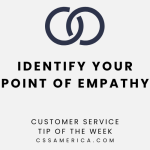
Life involves making a series of decisions, and whenever serving customers or dealing with difficult issues, those decisions can become more challenging.
Part of what makes decisions difficult is that there are so many factors to consider: People. Policies. Procedures. Places. Products. Processes. Personalities.
Who are the people involved? What policies apply? What are the procedures in this situation? Where is this taking place? What products are involved? What process is the customer using? What are the personalities of others…and yourself?
If we sat down and wrote a list of all the different factors that could be considered in our most challenging situations, we could probably come up with literally 100 different combinations of the factors I just referenced. The situation could be extremely complex.
But complex situations can still involve quick or effective decisions. It’s possible because you can narrow the focus of the decision. You’re not necessarily making the situation more simple; instead you’re simply focusing on your key decisioning factors: What are your priorities? What are your goals? What are your values?
As an example, I typically focus on what’s best for the customer, what’s best for our long-term relationship, and how I can help them succeed. I strive to make decisions that convey they’re important, that show I’ve listened, and that share a feeling of respect for them as a person. No matter the situation, if I’m guided by these considerations, the decision becomes much more clear.
If you are clear on what is most important in your decisioning process, then it’s easier for you to more quickly come to a decision.
The person could be your boss, co-worker, or a new customer. The situation could take place on the phone, on the website, in your office, or in a storefront. The other person could be flighty or fun, an optimist or a pessimist. But if you know your priorities, your goals, and your values, the decision will be much more clear more quickly.
How do you handle the conversation may be different; maybe the factors will apply in how you present or seek information, but your priorities and goals and values will help you narrow the focus of your decision-making process.
We can be presented with the complex. But when we are presented with the complex, revisit your priorities, goals, and values to bring some simplicity to the decision-making process.
Use simplicity to address the complex.
Signup for FREE Tips! Contact Us More Resources for You Visit Our Home Page














 I’ve been reading a book recently about a Charlotte-based service company, and the author of the book conveys the CEO’s perspective on management, culture, and serving customers. At the back of the book, the author noted the organization’s Core Values. They are honesty, integrity, fairness, and respect. I literally did a double-take on the pages, because my company’s Core Values are respect, honesty, fairness, and integrity. Yes, the order is different, but the values are the exact same!
I’ve been reading a book recently about a Charlotte-based service company, and the author of the book conveys the CEO’s perspective on management, culture, and serving customers. At the back of the book, the author noted the organization’s Core Values. They are honesty, integrity, fairness, and respect. I literally did a double-take on the pages, because my company’s Core Values are respect, honesty, fairness, and integrity. Yes, the order is different, but the values are the exact same! When I was young, if a child was asked what he wanted to be when he grew up, the answers were often a fireman, a Pro Football player, a teacher, somebody who got to drive a truck, or an astronaut. Maybe the question is still asked today, and, if so, I’m not sure how similar or different the answers may be from my childhood experiences. But when the question is asked, the child is basically stating what he or she wants to become. It is sharing their vision of their future.
When I was young, if a child was asked what he wanted to be when he grew up, the answers were often a fireman, a Pro Football player, a teacher, somebody who got to drive a truck, or an astronaut. Maybe the question is still asked today, and, if so, I’m not sure how similar or different the answers may be from my childhood experiences. But when the question is asked, the child is basically stating what he or she wants to become. It is sharing their vision of their future.






